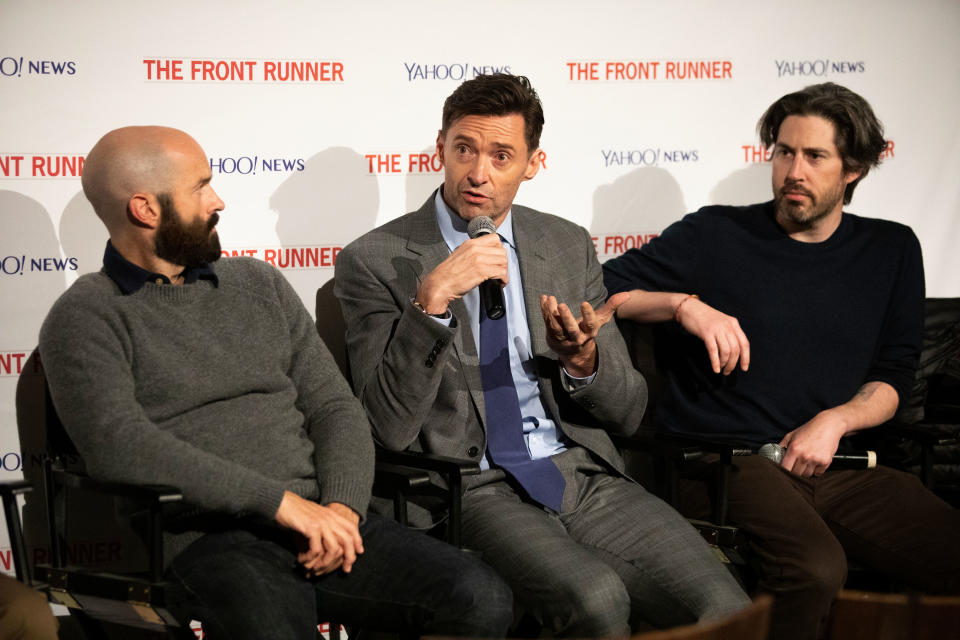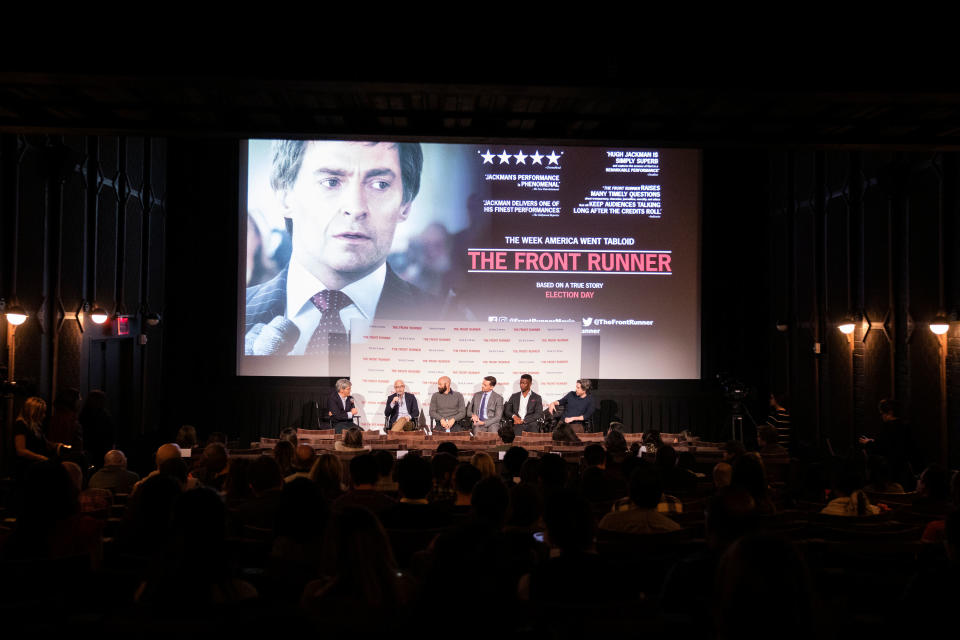Hugh Jackman on 'The Front Runner': I told Gary Hart I took his legacy 'very seriously'
Hugh Jackman spent a few days with former Sen. Gary Hart and his family at their home in Colorado to prepare for “The Front Runner” — a new film about the three weeks that upended his 1988 presidential campaign. Hart had been described as enigmatic and mercurial, so Jackman wanted to get a feel for his personality. But Jackman also wanted to let Hart, 81, a former U.S. senator from Colorado, know that he respected his story and would handle it tactfully.
“I wanted him to know and be able to look in my eyes and know that I took his life and his legacy very seriously, and this is a difficult situation and a difficult thing to bring up but we were doing it for hopefully a noble purpose, not just something to rehash over sensational sort of stories but to actually start a real conversation. I wanted him to know that,” Jackman said.
During a panel discussion after a screening of “The Front Runner” at the Metrograph on New York’s Lower East Side, Jackman said that Hart — who met him in his car at the airport — was most nervous about how the film would portray his wife, Lee Hart. But he but wound up loving actress Vera Farmiga’s performance.
“Here was a script with no heroes, no villains, just a whole bunch of humans in this extraordinary situation,” Jackman said.
The movie focuses on how allegations of an extramarital affair in 1987 derailed Hart’s campaign for the Democratic nomination, for which he was, as the title implies, a frontrunner. Hart’s most famous but not his proudest moment in public life was a harbinger of what was to come: the now-ubiquitous blending of entertainment and politics and the ruining of public careers based on private matters. The film meditates on the role of journalism, the sanctity of the electoral process and what the public has the right to know — without giving any easy answers.

The film’s director/co-writer Jason Reitman said he brought the film to Denver to watch it with Hart. Reitman said he hadn’t been that scared to show anyone a film since screening his first short film for his father.
“The first thing Gary said was, ‘Hugh Jackman is such a good actor’ and then he said, ‘Do I really talk like that?’ His wife said, ‘Yes, darling. That’s exactly how you speak,’” he said.
Long-time political strategist Jay Carson and Yahoo News National Political Columnist Matt Bai co-wrote the script with Reitman based on Bai’s 2014 book “All the Truth Is Out: The Week Politics Went Tabloid.” Carson said their respective experiences as a campaign adviser and a journalist helped their ability to portray both sides of that divide accurately.
“We did not write a movie where we made Gary Hart the hero,” Carson said. “We put a really complicated character up there and we let everyone here make their decisions. I bet if we had people fill out private cards to say, ‘Hey, do you think he was the hero or not? Do you think he should’ve been the president or not?’ it’s split 50-50. That’s usually what we find with audiences.”
Similarly, Reitman said the filmmakers didn’t put their thumbs on the scale to suggest that any one character is right or wrong in the overall narrative or during particular scenes.

“Every time we had two people in a room we tried to give each person the absolute strongest argument against the other one,” he said.
Bai said the Hart controversy was when the U.S. started to treat its political candidates more like celebrities and entertainers. He called it the moment when “the forces of entertainment and the forces of politics collide.”
“When you create a process that treats politicians like celebrities and entertainers you will inevitably get entertainers and celebrities as your candidates,” Bai said. “It’s something I talked about at the end of the book in 2014. I think the events from 2016 on have made it all that much more relevant, all that much more timely, frankly more so than we would like.”
According to Bai, the core of the movie is not just about privacy or scandal but about the campaign process that everyone — journalists, politicians and voters — had a hand in creating the kinds of people it attracts.
In the film, actor Mamoudou Athie plays A.J. Parker, a composite of two real-life journalists, who is conflicted over the media’s questions about Hart’s private life and whether the public has a right to know the answers. How do we separate what’s merely interesting from what’s relevant and in the public’s interest?

Yahoo News Chief Investigative Correspondent Michael Isikoff, who moderated the panel at the Metrograph, said people usually decide where they come down on these issues on a case-by-case basis.
Relating the conversation to current events, Isikoff asked Jackman whether the public has the right to know if Trump had a sexual relationship with pornographic actress Stormy Daniels. Jackman’s answer was safe and diplomatic.
“I’m very aware as an Australian who doesn’t vote here, I often think to myself, of course I have opinions about this, but I think if this were flipped and all of you guys were in Australia and you played Australian actors talking about ‘the dismissal,’ right, when the queen got rid of Gough Whitlam in 1975, a big moment in our politics, how would I feel if a bunch of American actors were telling me what was wrong with our system and I’d have a problem, even if I agreed with them,” Jackman said. “So I’m going to let that one go through.”
_____
Read more from Yahoo News:
The CIA’s communications suffered a catastrophic compromise. It started in Iran.
Ending the Qatar blockade might be the price Saudi Arabia pays for Khashoggi’s murder
How Robert Mercer’s hedge fund profits from Trump’s hard-line immigration stance
Trump’s target audience for migrant caravan scare tactics: Women
Photos: Fatal infernos: California blazes grow as hundreds go missing



